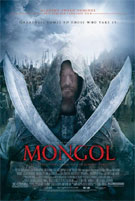With the exception of 10,000 B.C. (if that even counts), it’s been a while since we had an honest-to-God outdoors epic. The kind of movie that Lawrence of Arabia personifies, and Kevin Costner and Mel Gibson revived in their own 90s vanity projects Dances with Wolves and Braveheart.
Now Russian director Sergei Bodrov is doing his best to bring back rugged men on horseback who conquer foreign lands, and his Mongol is a pretty good effort. The stunning location shots in Mongolia and massive battle scenes tend to overshadow the story he is telling about the early life of Genghis Khan, but for people who miss seeing men riding on horseback and shouting “Charge!”, Mongol can scratch that itch.
Japanese star Tadanobu Asano is in the lead as young Genghis Khan, but the movie starts with the man at an even younger age, the 9-year-old Temudgin (Odnyam Odsuren), as he was known before he received the ceremonial Khan title. Temudgin’s father, a tribal leader, is bringing his son to meet with another tribe, hoping a marriage between the boy and a girl of that tribe would unite the two in peace. One of Genghis Khan’s greatest accomplishments as ruler was uniting the tribes of Mongolia, but the boy Temudgin was subject to many inter-tribal conflicts.
They begin soon after Temudgin chooses 10-year-old Borte (Bayartsetseg Erdenebat) as his wife, and promises to marry her in five years. On the way back home Temudgin’s father is poisoned by the head of a rival tribe, and soon his village has been raided, Temudgin and his mother fleeing into exile. The rest of Temudgin’s childhood is either spent fleeing from the rival tribe or being captured by them, but when he and Borte (now played by Khulan Chuluun) reunite as adults, Temudgin begins to grow into the Khan he will be.
Bodrov tells his story with the notion that interpersonal relationships, whether his marriage to Borte or friendship with tribal prince Jamukha (Honglei Sun), determined the route of Genghis Khan’s life as much as his desire for power. His thesis holds up, at least in this early section of the ruler’s life, as Temudgin wages war for Borte’s honor and strives to maintain peace with Jamukha when the two begin competing for power. Bodrov might go a little over the top in depicting Temudgin as a family man, though; he suggests that two of his children were the result of Borte’s rape at the hands of other men, but Temudgin immediately accepted the children as his own. Can a guy who conquers a quarter of the known world really be that much of a doormat?
With scenes of battle, plunder and chaos sprinkled in throughout Temudgin’s story, Mongol’s ponderous pace never gets too slow, and Asano strikes an imposing figure as the guy who practically invented charismatic leadership. Though we Westerners don’t have the same strong opinions about Genghis Khan that Bodrov’s countrymen do, the movie gives us an opportunity to consider one of history’s most important figures without too much bias factoring in. If you like your epics sweeping and bloody and real, Mongol may be the best you get for a long while.
Your Daily Blend of Entertainment News
Staff Writer at CinemaBlend


